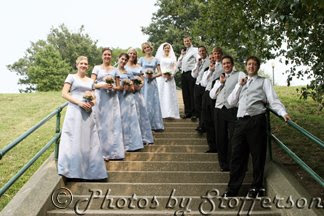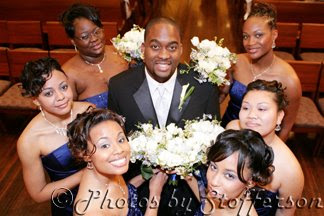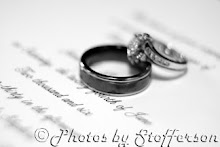Why do I refer to wedding photography, or photography in general, as an investment? Think about it for a few moments. An investment is something that you make expecting a positive return. The same goes for your wedding photography. You invest thousands (or tens of thousands) of dollars into your wedding. You need to invest in a quality photographer (or photographers) to capture the memories of your day (and the money that you've spent).
 It still amazes me that people will spend thousands on rings, locations, linens, dresses and the like, then look for the cheapest photographer around to capture their memories. Obviously, as a photographer I am a bit biased about this, but there is some logic to my point of view. After all is said and done, you will have (hopefully) gifts, a dress (that will probably never be worn again), possibly a video, probably an outstanding bill or two and pictures. Some of the pictures will come from your guests or table cameras, but the bulk of them should come from your photographer. Your pictures will be constant reminders of the things that happened on your wedding day. They should last more than a lifetime (if they are stored properly) and will probably be the most seen/viewed/noticed items from your wedding.
It still amazes me that people will spend thousands on rings, locations, linens, dresses and the like, then look for the cheapest photographer around to capture their memories. Obviously, as a photographer I am a bit biased about this, but there is some logic to my point of view. After all is said and done, you will have (hopefully) gifts, a dress (that will probably never be worn again), possibly a video, probably an outstanding bill or two and pictures. Some of the pictures will come from your guests or table cameras, but the bulk of them should come from your photographer. Your pictures will be constant reminders of the things that happened on your wedding day. They should last more than a lifetime (if they are stored properly) and will probably be the most seen/viewed/noticed items from your wedding. 
So, what should you expect to pay your wedding photographer? Well, the books (formal wedding planning guides) say that you should plan to spend approximately ten percent of your total wedding budget. If you haven't figured out your budget yet, do it now before your spending gets out of control. My logic is a little different. Ten percent is a good starting point, but don't limit yourself to that specific number. Do some research and decide what you want, and more importantly, what you need in a wedding photographer. Then shop around carefully. Look at the photographers in your price range as well as a few that are just above it. Why? The answer is simple. Someone in your price bracket may not offer everything that you need for what you planned to spend. And when you add in the additional items that you need, the price may rise to more than someone who starts in a higher bracket. For example, you find a photographer for $1500 who works for 4 hours and provides 350 proofs, but you need someone to be there the entire day and provide all of the proofs shot. Adding those two options takes his price to $2500. Another photographer starts at $2200 and works the entire wedding, provides all proofs and puts your wedding online. Suddenly $2200 is a deal, where it looked expensive at first.

This is where comparisons become important. If you only compare package prices with making sure that the contents match, you can end up getting less for your money. Don't be afraid to ask for the names of the albums they use, or what kind of equipment they use. Since you are spending your money, there are truly no stupid questions. You should be very comfortable in the decision that you make. And don't overspend. You have to live after your wedding day is over. Focus on what you need first then try to get everything that you want.
And guess what? There is something that is just as important as the cost. What's that? The photographer's personality. Who is the only stranger who will spend more time with you on your wedding day? Your photographer. You need to make sure that you can get along with him/her. If you are uncertain after the initial meeting/interview, I highly recommend that you schedule a portrait session to find out how they do their job. You don't need any additional annoyances on your wedding day.
Well, I hope that you understand how photography of your wedding is an investment. Your wedding day will be a blur (I speak from experience here). It should be important for you to have as many lasting memories as possible. Take care in making our choice and you will have memories that last beyond your lifetime.


If you would like to see some examples of how I capture weddings, click here.

